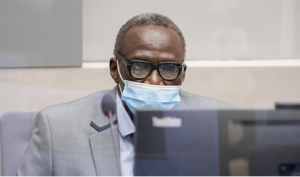By: Jamie McLennan
Impunity Watch Staff Writer
THE HAUGE, Netherlands – Ali Muhammad Ali Abd-Al-Rahman was transferred to the International Criminal Court’s custody on June 9th, 2020, after voluntarily surrendering himself in the Central African Republic. Ali Muhammad is the alleged leader of the Janjaweed, a militia civilian group in Africa.

The first arrest warrant against him lists fifty criminal counts of alleged attacks against civilians in the towns of Kodoom, Bindisi, Mukjar and Arawala between August 2003 and March 2004. The alleged crimes include twenty-two counts of crimes against humanity, murder, forcible transfer of population, imprisonment, rape, torture, persecution and inhumane acts of inflicting serious bodily injury. The list continues with a total of fifty-three counts for his individual criminal responsibility for crimes against humanity allegedly committed in Sudan.
The ICC will not hear a case without the accused individual in custody and present at the hearings. At the time of arrest, there were 27 international warrants for Ali Muhammad that spanned from April 2007 to June 2020. After Ali Muhammad was placed in custody, the initial hearing was scheduled to take place on December 7th, 2020. However, the confirmation of charges has been delayed until February 22nd, 2021. The court reviewed each party’s stance, taking into account the fairness and efficiency of the court’s proceedings, the rights of the suspects and victims, and the overall safety and security of the proceedings moving forward. The prosecutor requested an extended timeline to collect more evidence against Ali Muhammad. After much consideration, the court determined that there should be a later date for the confirmation of charges and later deadlines for the disclosure of evidence by the prosecutor.
The purpose of the confirmation of charges hearing is for the court to evaluate the evidence of the crimes to establish if there are substantial grounds to believe that the accused individual committed the alleged crimes. If the court believes that the evidence is sufficient, the case will then be transferred to the Trial Chamber, where the proceedings will move to the trial phase. Due to COVID-19, the ICC is using a web streaming service to broadcast all hearings with a thirty-minute delay for any private information that may need to be redacted.
For further information, please see:
International Criminal Court- Decision on the Prosecutor’s Request for Postponement- 2 Nov. 2020
International Criminal Court- Press Release- 2 Nov. 2020
International Criminal Court- Redacted First Warrant of Arrest- 27 April 2020
International Criminal Court- Redacted Second Warrant of Arrest- 11 June 2020